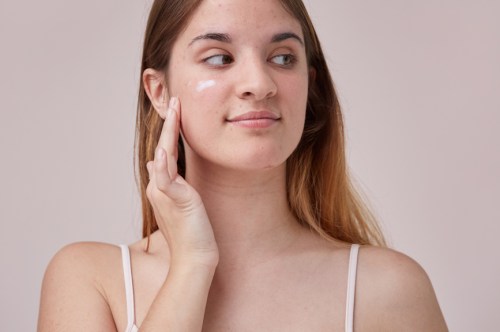‘I’m a Dermatologist, and I’m Begging You To Stop Relying on Spot Treatments as an Acne Cure-All’
Dermatologists explain why you should stop spot treating acne to fend off pimples, and what you should be doing instead.

Whenever a big, painful pimple pops up, the easiest fix is to stick on a pimple patch and hope for the best. But while spot treatments can be helpful for making those individual zits go away, according to dermatologists, when you’re relying on them as your only acne solution, you’re ignoring the root of the problem.
Experts in This Article
board-certified dermatologist and founder of Dr. Dennis Gross Skincare
director of cosmetic and clinical research in dermatology and associate professor of dermatology at Mount Sinai Hospital
“People spot treat, and that is completely off of the course—you want to prevent that,” Dennis Gross, MD, a board-certified dermatologist and founder of Dr. Dennis Gross Skincare, previously told Well+Good . “Spot treating is fine, but you’ve already lost the battle.”
The reason? When you’re spot treating, you’re essentially only targeting a single clogged pore—and completely ignoring the rest of your pores, which could become clogged in the future. “Think of your face as having thousands of pipes connecting your oil glands to the surface of the skin. In people who are acne prone, all of those pipes are somewhat clogged,” says Joshua Zeichner, MD, a board-certified dermatologist based in New York City. “We have no way of predicting which ones will become clogged enough to lead to a full pimple.”
This Parisian Skincare Brand Is Launching in the United States for the First Time—Here’s What a Derm Wants You to Know

We’re Calling It: Cleansing Balms Are the Face Wash of the Future—Here Are 3 to Add to Your Cart

This Is the One Product That Scarlett Johansson Always Keeps in Her Purse and on Her Bedside Table

Although spot treating can help clear away a rogue zit that already exists, it’s doing nothing to address any of the rogue zits you’ve already gotten, and it’s doing nothing to prevent future ones from occurring. “The best way to treat acne is to prevent all of those pipes from becoming completely blocked,” says Dr. Zeichner.
While it’s totally fine to grab a benzoyl peroxide or salicylic acid-infused spot treatment when you’re in a pinch, your best bet is to get ahead of the problem and craft a routine that will keep acne at bay before it happens. That way, you won’t be stuck playing catch up any time it does. “The important thing is to use something all over your face on a regular basis, at least in the zones where you’re prone to acne in the first place—that’s the key thing,” says Dr. Gross. “Treating the full face means that you can prevent acne rather than just treating pimples that you already have,” adds Dr. Zeichner.
If you’ve got acne-prone skin, this means making pimple-preventing ingredients a part of your regular routine—even when you don’t have any visible zits dotting your complexion. A good cleanser will keep your skin clear of acne-causing gunk and grime; AHAs and BHAs gently exfoliate the surface of your complexion to get rid of the dead skin cells that clog your pores; and a nightly retinol serum stimulates cellular turnover to make sure those dead skin cells really are gone for good. These ingredients will help to stop acne before it starts, which means that if it does happen, any spot treatment you use will be set up for its ultimate success.
Oh hi! You look like someone who loves free workouts, discounts for cult-fave wellness brands, and exclusive Well+Good content. Sign up for Well+, our online community of wellness insiders, and unlock your rewards instantly.
Sign Up for Our Daily Newsletter
Get all the latest in wellness, trends, food, fitness, beauty, and more delivered right to your inbox.
Got it, you've been added to our email list.







